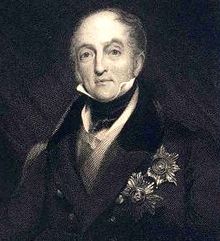Gore Ouseley
Sir Gore Ouseley, 1st Baronet GCH (born June 24, 1770 in Limerick , † November 18, 1844 in Hall Barn Park, Beaconsfield , Buckinghamshire ) was a British entrepreneur, linguist and diplomat .
Life
Gore Ouseley was the son of Elizabeth Holland and Ralph Ouseley. He was home schooled with his brother William and cousin Gideon Ouseley. He was married to Harriet Georgina Whitelocke. Frederick Ouseley (1825–1889) was one of her three daughters and two sons .
He was employed by the British government in Lucknow when the local nawab , Saadat Ali Khan II, became his friend. Saadat Ali Khan II commissioned Gore Ouseley with the planning of his palace, Dilkusha Kothi on the banks of the Gomti near Lucknow . This palace was damaged during the siege of Lucknow during the Sepoy Uprising in 1857 . In India, Gore Ouseley was made major and on October 3, 1808, on the recommendation of Richard Colley-Wellesley, 1st Marquess Wellesley to the hereditary baronet , of Claremont in the County of Hertford .
From 1810 to 1814 he was ambassador to Tehran. He was accompanied by his brother, Embassy Secretary Sir William Ouseley, who, like Gore, was an enthusiastic Orientalist .
Peace of Gulistan
The interests of the British East India Company (EIC) included shielding British India from Europe. The Egyptian expedition was interpreted by the EIC as preparation for a Franco-Ottoman expedition against British India. In 1807 agents launched that Napoleon Bonaparte and Alexander I had agreed to attack British India together. The Great Game knows numerous examples of power-political inefficiency. The work of Gore Ouseley in mediating the peace of Gulistan shows, not only on this scale, a rarely achieved power-political efficiency. Among other constellations, the EIC pushed for the formation of nations and Napoleon Bonaparte used this method of rule up to the wars of liberation in Europe. After the Russo-Persian War , Ouseley, as an advisor to Fath Ali Shah , brokered the peace of Gulistan between Alexander I of Russia and Fath Ali Shah. In the peace of Gulistan, a border between the Russian Empire and Persia was established. The Shia Abbas Mirza was promised the peacock throne opposite his Sunni half-brother Mohammed Ali Mirza. With the treaty of October 24, 1813, Transcaucasia was added to Russia, while Persia (?).
His brother William Ouseley returned to England in 1813 and wrote books on oriental studies.
Mirza Saleh Shirazi was an advisor to Gore Ouseley with the chaplain EIC Rev. Henry Martyn, BD (* February 18, 1781, † October 16, 1812) translated into Shiraz . a New Testament in the Persian language . Fath Ali Shah received a review of the work at Ouseley's instigation and thanked Ouseley for it in a letter. In 1814 Ouseley went with Mirza Saiyad Ali Khan to Saint Petersburg , where Ouseley was accepted into the Alexander Nevsky Order and in 1815 became an honorary member of the Russian Academy of Sciences . Mirza Saiyad Ali Khan became Persian Ambassador to Saint Petersburg and in 1815 wrote the New Testament in Persian in Hebrew letters .

Publications
- Gore Ouseley (Ed.); Mirza Seid Ali Khan, Rev. Henry Martyn: The New Testament in Persic. St. Petersburg 1815.
Individual evidence
- ^ Foreign members of the Russian Academy of Sciences since 1724. Sir Gore Ouseley. Russian Academy of Sciences, accessed October 28, 2015 .
- ^ Thomas Hartwell Horne: A manual of biblical bibliography: comprising a catalog. P. 109.
- ^ William Brown: The history of the propagation of Christianity among the Heathen. Volume 1, p. 674.
| predecessor | Office | successor |
|---|---|---|
| New title created | Baronet, of Claremont 1808-1844 |
Frederick Ouseley |
| Harford Jones |
British ambassador to Tehran 1810–1814 |
James Justinian Morier |
| personal data | |
|---|---|
| SURNAME | Ouseley, Gore |
| ALTERNATIVE NAMES | Ouseley, Sir Gore, 1st Baronet |
| BRIEF DESCRIPTION | British entrepreneur, linguist and diplomat |
| DATE OF BIRTH | June 24, 1770 |
| PLACE OF BIRTH | limerick |
| DATE OF DEATH | November 18, 1844 |
| Place of death | Hall Barn Park, Beaconsfield , Buckinghamshire |
